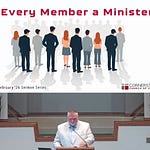Welcome and Introduction
It’s so good to see all of you today—a great crowd here at Cornerstone. Thank you for being with us. If you’re visiting, we want to especially welcome you and invite you to come back any time you're in our area. It’s a blessing to have you with us.
Hard to believe, but we’re already in the second half of July. Summer is slipping away, and we’re now three weeks into our sermon series called “The Kingdom Is Everything.” In this series, we’ve been learning how central the Kingdom of God is to the gospel, to our calling, and to our identity.
When we study the Kingdom, we see that it represents Jesus’ rule, His reign, and His rescue. Two weeks ago, in Titus 3, we saw that Jesus is the Savior of mercy—that the Kingdom begins with mercy, not merit. Last week, in Luke 4, we examined Jesus’ first recorded sermon and saw that the Kingdom is for the poor, the captives, the blind, and the oppressed—those humble enough to admit their need. But we also saw the pain of rejection, as Jesus’ own people in Nazareth refused to see their need and missed the Kingdom entirely.
So far, we’ve seen that the Kingdom is merciful and that it belongs to the desperate. Today, we turn to Matthew 22 and a powerful parable about a royal wedding feast—a picture of the invitation to the Kingdom and how people respond to it.
A Real-Life Parable: Crashing the King’s Feast
To bring this idea closer to home, consider something that happened in 2009 at President Obama’s first state dinner. A couple named Tareq and Michaele Salahi crashed the event. They weren’t on the guest list. They didn’t have an invitation or proper clearance. Yet, they walked past security, took selfies, shook hands with the Vice President, and even met the President. It wasn’t until the next day—after they posted photos online—that the Secret Service realized what had happened. They looked the part, acted the part, but they had no right to be there.
That’s the picture Jesus paints in Matthew 22. The Kingdom is a glorious celebration—but it is also a holy one. And not everyone who shows up belongs there. This parable reminds us that you can’t crash the Kingdom. You must be invited—and clothed—in the righteousness the King provides.
Section 1: The King’s Gracious Invitation (Matthew 22:1–4)
Jesus begins by describing a royal wedding feast prepared by a king for his son. This isn’t just a casual get-together—it’s the most important celebration in a royal family’s life. In ancient culture, these feasts could last a week or more, and to be invited was a mark of relationship and favor.
In the parable, the king represents God, and the son is Jesus. The feast symbolizes the full blessings of the Kingdom: salvation, communion with God, and eternal joy. The Kingdom is not just about rescue—it is also a royal summons to joy.
In verses 3–4, the king sends out two invitations. First, he invites the guests. Then, once everything is ready, he sends servants again to say, “Come!” But shockingly, the people refuse to come. This wasn’t just impolite—it was rebellion. Who refuses a king?
And yet the king responds with patience and grace. He sends another round of messengers, explaining everything is ready—the oxen, the fattened cattle—it’s all prepared. He longs for people to share in his joy.
This is a picture of God’s relentless grace. He does not wait for us to come to Him—He pursues us. Through prophets, John the Baptist, Jesus Himself, and now us—He sends His messengers with the good news: the feast is ready.
Section 2: The Invitation Rejected (Matthew 22:5–7)
Despite this gracious invitation, the response is tragic. Some ignore it—caught up in their fields and businesses. Others violently reject it, even killing the messengers.
Indifference is the most common response to the gospel in our day. We’re not talking about open rebellion, just people who are too busy. They choose the routine over the royal, the temporal over the eternal.
But others go further. They become hostile. Verse 6 tells us the rest seized the servants and killed them. This echoes Israel’s treatment of the prophets, John the Baptist, and ultimately Jesus. It also foreshadows the persecution of the early church—and the resistance many of us still face today.
Verse 7 is sobering. The king’s patience ends. Judgment falls. In a prophetic sense, this points to the destruction of Jerusalem in A.D. 70—a fulfillment of Jesus’ warning. The message is clear: grace is real—but so is judgment.
Section 3: The Invitation Extended to All (Matthew 22:8–10)
After rejection, the king opens the invitation to everyone—those in the highways and alleys, the good and the evil. This is the gospel extended to the unexpected and unworthy—an image of the invitation going out to the Gentiles and to the world.
The Kingdom is for the grateful, not the entitled—for the humble, not the proud. The only qualification is a willingness to come.
Think of 1 Corinthians 6, where Paul lists a catalog of sin: sexual immorality, greed, drunkenness, and more. And then he says, “Some of you used to be like this.” But then—“you were washed, sanctified, justified.” That’s the gospel. That’s grace.
The table will be filled. The Son will be celebrated. And our job as the King’s servants is to go out and invite everyone—without screening them or assuming they’re too far gone.
Section 4: The Garment Required (Matthew 22:11–13)
The parable takes a final twist. The king enters the banquet and sees someone not dressed in wedding clothes. In ancient times, wedding garments were provided by the host, and to refuse to wear them was an act of disrespect.
This man wanted to attend—but on his own terms. He wanted the benefits of the Kingdom without the transformation it requires. He represents the religious hypocrite: someone who wants salvation without surrender, heaven without holiness, grace without obedience.
Verse 13 is devastating. The man is cast into outer darkness. Jesus speaks here of hell—a place of exclusion, where those not clothed in righteousness are separated from God.
Garments in Scripture often symbolize righteousness. Isaiah 61 speaks of being “clothed in salvation and wrapped in a robe of righteousness.” Galatians 3:27 says, “As many of you who were baptized into Christ have been clothed with Christ.”
Only those who wear the garments provided by the King—Christ’s righteousness—will be allowed to remain at the feast.
Conclusion: Have You Responded?
The parable closes with this warning: “Many are invited, but few are chosen.” The tragedy is not just rejection—it’s the rejection of joy. The Kingdom is not about being good enough or religious—it’s about being clothed in Christ.
If you are a Christian, you’ve had a small taste of the joy that’s coming—the joy of worship, community, and God’s presence. But the full celebration is still ahead, and it will be eternal.
So why would we ever walk away from that?
If you need Jesus today, everything is ready. The invitation has gone out. Will you accept it?
You can respond by turning from your sin, confessing Jesus as Lord, and being baptized for the forgiveness of your sins. If we can help you in any way, come forward as we stand and sing.











